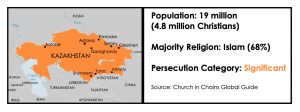
Kazakhstan is the largest country in Central Asia and the eighth largest in the world, but its population density is very low (fewer than six people per square kilometre) since it is mostly desert or mountain steppe.
Kazakhstan has huge oil and gas reserves and close economic links with Russia and China. Major investment in the oil sector since 1991 brought rapid economic growth and oil money is responsible for the development of Astana, which became the capital in 1997, taking over from Almaty. However, the economy has declined in recent years.
The government’s repressive regime controls society very tightly and the Organisation for Security and Co-operation in Europe considers elections not to be free and fair. Kassym-Jomart Tokayev has been president since 2019, chosen by his predecessor Nursultan Nazarbayev, who ruled for almost three decades. He was re-elected in a landslide victory in November 2022.
Religion
About two thirds of the population is ethnic Kazakh (mainly Muslim) and about a quarter ethnic Slav (mainly Russian Orthodox), with some smaller minorities. Kazakhstan is constitutionally secular, with freedom of religion, and the government promotes Kazakhstan internationally as an example of “religious tolerance and dialogue” but severely restricts the activities of all religious groups apart from state-controlled Islam and the Russian Orthodox and Roman Catholic churches.
As in other central Asian countries, the threat of Islamic extremism has led the government to impose increasing restrictions. Unregistered religious activity and proselytism are illegal (including distributing religious literature without permission) and the activities of registered groups are strictly regulated. Sunni Islam, the majority religion, is under total state control and other Muslim groups such as Ahmadis are banned. Several legally resident foreigners – including Muslims, Jehovah’s Witnesses and Protestants – have been fined and handed deportation orders in recent years as illegal “missionaries“.
The Russian Orthodox Church (the largest church in Kazakhstan) experiences few difficulties as the government does not view it as a threat, and Catholic churches are exempt from registration due to a government agreement with the Vatican, but other denominations are facing increasing problems. Amendments to Kazakhstan’s repressive Religion Law (see below) that came into force in January 2022 make it even more difficult to hold religious events. Christian converts from Islam come under pressure to recant from family and community.
Access to religious literature in Kazakhstan is strictly controlled: the government censors all religious texts, restricts where they may be sold and has banned at least 695 texts (including Muslim, Ahmadi, Christian, Hare Krishna and Jehovah’s Witness) for alleged extremism.
Repressive laws
In 2011, Kazakhstan’s government introduced a repressive Religion Law that increased restrictions on meetings and “missionary activity” for all religions. The law required religious groups to re-register under greater restrictions, a complex and expensive process, and it required that religious groups have at least fifty members locally, five hundred regionally and 5,000 nationally in order to register, which is impossible for small churches. In 2018 the government approved a set of amendments that imposed even harsher restrictions, including a ban on religious teaching unless within a registered organisation.
On 29 December 2021, President Tokayev signed into law further amendments to the Religion Law that make holding religious events away from state-registered places of worship more difficult. Any state-registered religious community that wants to hold a pilgrimage or other event away from their state-registered place of worship now needs advance state permission and must provide details including start and end time, how people will get there, whether loud speakers will be used and how many vehicles will be used plus their travel route. The amendments came into force on 9 January 2022.
Civil disobedience
Forum 18 News Service reports that members of churches affiliated with the Baptist Council of Churches in Kazakhstan (and other countries in Central Asia) have chosen a policy of civil disobedience, refusing to register or to pay fines imposed for practising their faith.
Affiliated congregations are frequently raided and police fine members with no court hearing for leading or participating in religious meetings without state permission.
Many who refuse to pay fines are put on Kazakhstan’s exit blacklist, preventing them from leaving the country, and some have property confiscated (such as washing machines or cars), while others have restraining orders placed on property (homes, cars, livestock), preventing them from selling.
(Barnabas, BBC, Forum 18, US Commission on International Religious Freedom, Voice of the Martyrs Canada, World Watch Monitor)
